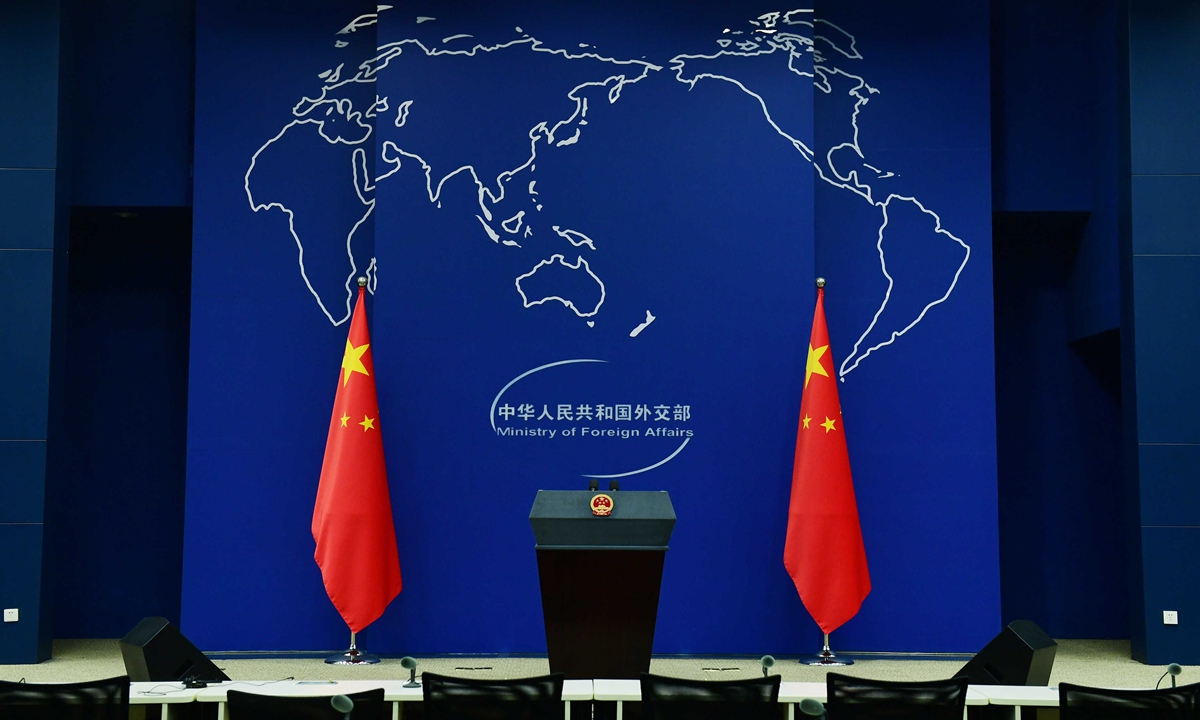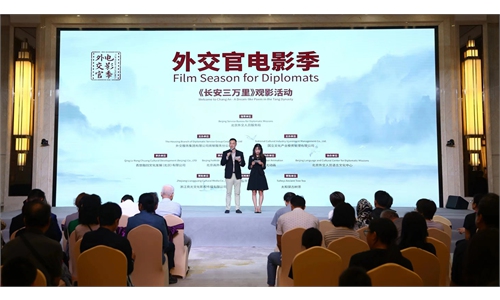China’s first foreign state immunity law safeguards sovereignty, plays deterrent role
Law provides a robust legal basis for China to reciprocally counter baseless lawsuits driven by anti-China forces: official

Ministry of Foreign Affairs
Three days after China's top legislature adopted a long-awaited foreign state immunity law - the first law in the country's history that comprehensively stipulates the foreign state immunity system, marking a milestone in rule of law fields related to foreign affairs, the Chinese Foreign Ministry said on Tuesday that the law aims to protect the lawful rights and interests of the parties concerned, safeguard the sovereign equality of states and promote friendly exchanges with other countries, which all in turn will boost China's higher-level opening-up.The new foreign state immunity law was adopted at a session of the National People's Congress (NPC) Standing Committee on Friday, and it will take effect on January 1, 2024. It has 23 provisions and stipulates that China will move away from the absolute theory of foreign state immunity and adopt the restrictive theory of foreign state immunity.
Calling the move a "necessary adjustment" to China's sovereign immunity policy, an official of the Legislative Affairs Commission of the NPC Standing Committee was quoted in a report by the Xinhua News Agency saying the new law will help protect the legitimate rights and interests of Chinese citizens and legal persons, and safeguard China's sovereignty, security and development interests.
According to the law, Chinese courts can legally accept and adjudicate cases with a foreign state as the defendant under certain conditions, Director-General of the Department of Treaty and Law of the Foreign Ministry Ma Xinmin told China Central Television in a latest interview.
Before the adoption of the foreign state immunity law, Chinese courts, for a long time, wouldn't process cases with a foreign state as a defendant or cases against a foreign state's assets, Ma said.
This led to two disadvantages: First, Chinese citizens and enterprises couldn't defend their legitimate rights and interests in Chinese courts when they encounter commercial disputes with foreign states. On the other hand, in recent years, some foreign courts have frequently accepted and exercised jurisdiction over baseless and frivolous lawsuits against China, creating an imbalanced situation since Chinese courts couldn't exercise jurisdiction over foreign states, he noted.
Introducing the law is a normal legislative activity by China's NPC that fully adheres to international law and is consistent with general state practices, the Chinese Foreign Ministry said.
The law affirms the fundamental principle that a foreign state and its property enjoy immunity in China, at the same time stipulates exceptions relating to non-sovereign act of a foreign state, under which Chinese courts can exercise jurisdiction, such as cases involving disputes arising out of commercial activity, relevant personal injury and property damage.
It also states that Chinese courts can take compulsory judicial measures against a foreign state's commercial property under strictly limited circumstances.
China firmly upholds the principle of sovereign equality and will faithfully implement this law to protect the legitimate rights and interests of Chinese nationals and legal persons and respect the immunities enjoyed by foreign states under international law, the ministry added.
"In recent years, some foreign courts, influenced by anti-China forces, have been accepting baseless lawsuits against China and even clamored to strip China of the state immunity it should enjoy under international law," Ma said, noting that the enactment of the foreign state immunity law provides a robust legal basis for China to reciprocally counter such actions, playing a preventative, cautionary, and deterrent role.
"It's a necessary step to confront challenges and mitigate risks using rule-of-law thinking and methods," he said.
'A very significant move'
In 2020, some 35 lawmakers raised a special motion during the two sessions, urging the country to speed up formulating a foreign state immunity law that will grant Chinese citizens and companies the right to sue other countries in domestic courts, in an attempt to retaliate against US' abuse of litigation against China over the COVID-19 pandemic.
"After the outbreak of the COVID-19 pandemic in 2020, some Americans and even individual states within the US sued China in American courts, demanding that China assume substantial compensation liability for the pandemic, and these cases were accepted by US courts," Huo Zhengxin, a law professor at the China University of Political Science and Law, told the Global Times on Tuesday.
Meanwhile, some Chinese citizens wanted to sue the US government in Chinese courts, accusing it of smearing and stigmatizing China, thereby infringing upon the legitimate interests of the Chinese nation and its citizens. However, due to China's stance on absolute immunity, its courts couldn't accept these cases, Huo said.
"That situation illustrated that the stance of absolute immunity no longer helps safeguard China's national interests. In fact, it has resulted in an unequal situation where foreign courts can exercise jurisdiction over China, but Chinese courts cannot exercise jurisdiction over foreign states," he said.
Some experts also believe that given the US has already imposed sanctions on a lot of Chinese companies, after the enactment of the foreign state immunity law, those companies would be able to sue the US government in Chinese courts, which is another highly significant step after the country passed the Anti-Foreign Sanctions Law in June 2021.
Following the enactment of the law, some netizens have been wondering whether Chinese courts can now handle cases involving the infringement of rights of Chinese fishermen amid Japan's forceful dumping of nuclear-contaminated water, and if any relevant Chinese enterprise or individual can sue Tokyo Electric Power Company for compensation after the law comes into force, and if Chinese courts can accept the case under certain conditions and make a final trial.
"In theory, such case can be filed, and the court can also accept it. However, I think it is very difficult to prove that the nuclear-contaminated water has caused real economic or physical damage to the plaintiff," Huo said.
Higher level of opening-up
Besides that the enactment of the law serves as a crucial move for resolutely defending national sovereignty, security, and development interests, it represents a significant measure to practice legislation for the people and an essential means to support China's high-quality development and facilitate high-level opening-up to the outside world, said Ma, the foreign ministry's official.
The scope of "exercising jurisdiction" includes situations where a foreign state explicitly accepts jurisdiction over specific matters or cases; litigation arising from commercial activities; litigation stemming from the performance of labor or service contracts; compensation litigation related to tortious acts; and matters related to arbitration, Louis Chen, a member of the Election Committee and general secretary of the Hong Kong Legal Exchange Foundation, told the Global Times on Tuesday.
After the law is enacted, Hong Kong and Macao special administrative regions should follow the central government in adopting the state immunity rules and policies set out in the law.
The provisions of this law regarding the circumstances under which Chinese courts can exercise jurisdiction are strict and specific, and they align with relevant international treaties and prevailing international practices, Chen said.
"In the long run, adopting the principle of restrictive immunity will demonstrate the Chinese government's responsible attitude to foreign investors, providing them with a stable expectation for the protection of their investments. This supports China's opening-up and the deepening development of the Belt and Road Initiative," he added.





